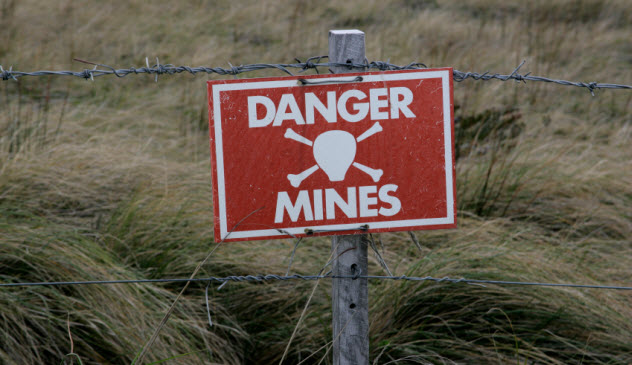 Creepy
Creepy  Creepy
Creepy  Movies and TV
Movies and TV 10 Movies That Get Elite Jobs Right, According to Experts
 Weird Stuff
Weird Stuff 10 Times Real Laws Were Based on Bizarre Hypotheticals
 Animals
Animals 10 Inspiring Tales of Horses Being Human
 Mysteries
Mysteries Top 10 Haunting Facts About the Ghost Ship MV Alta
 History
History 10 Surprising Stories About the Texas Rangers
 Humans
Humans 10 Philosophers Who Were Driven Mad by Their Own Theories
 Miscellaneous
Miscellaneous 10 Video-Game-Worthy Weapons and Armors from History
 Weird Stuff
Weird Stuff 10 Psychics Who Accurately Predicted Wartime Events
 The Arts
The Arts 10 Pieces of Art Inspired by a Broken Heart
 Creepy
Creepy 10 Death Superstitions That Will Give You the Creeps
 Movies and TV
Movies and TV 10 Movies That Get Elite Jobs Right, According to Experts
 Weird Stuff
Weird Stuff 10 Times Real Laws Were Based on Bizarre Hypotheticals
Who's Behind Listverse?

Jamie Frater
Head Editor
Jamie founded Listverse due to an insatiable desire to share fascinating, obscure, and bizarre facts. He has been a guest speaker on numerous national radio and television stations and is a five time published author.
More About Us Animals
Animals 10 Inspiring Tales of Horses Being Human
 Mysteries
Mysteries Top 10 Haunting Facts About the Ghost Ship MV Alta
 History
History 10 Surprising Stories About the Texas Rangers
 Humans
Humans 10 Philosophers Who Were Driven Mad by Their Own Theories
 Miscellaneous
Miscellaneous 10 Video-Game-Worthy Weapons and Armors from History
 Weird Stuff
Weird Stuff 10 Psychics Who Accurately Predicted Wartime Events
 The Arts
The Arts 10 Pieces of Art Inspired by a Broken Heart
10 Bizarre Aspects Of American Foreign Policy
The US is the richest country on Earth, the third largest, and one of only two superpowers (the other being China). So it makes sense that foreign policy for such an influential country might be complex. But it’s often bizarre, too. From the contradictory to the just plain strange, there are plenty of US policy decisions that can only be described as “weird.”
10Nearly Voting Against Itself At The United Nations

Every year, the countries of the United Nations gather to pass judgment on the continued embargo of Cuba by the US. The vast majority vote to condemn it while a handful abstain. The only two countries that always vote against the motion are the US and Israel.
In 2015, those two were nearly whittled down to one. Not because Israel chose to abandon its stalwart ally but because the US almost abstained. In practice, this would have meant the US was publicly condemning itself.
After 54 years, the White House reestablished diplomatic relations with Cuba earlier this year. The move was hailed as Obama’s signature foreign policy achievement, effectively bringing an end to the last remnant of the Cold War in the Americas. However, the White House can’t end the embargo against Havana by itself. That decision is up to Congress, and the Republicans really aren’t in the mood to cooperate.
As a result, the US now stands opposed to itself. This became apparent at the UN vote when the US delegation publicly considered abstaining. It would have been the first time in history that a UN member chose not to oppose a resolution critical of its own laws, leaving only Israel to side with a policy even Washington wanted to disown.
In the end, a combination of public pressure and the inflammatory wording of the resolution convinced the US not to abstain. But it’s ridiculous that this was even considered.
9Refusing To Ratify A Treaty That Would Benefit America

The UN Law of the Sea Treaty is a straightforward piece of international law. Ratified by 166 countries, it gives drilling and fishing rights to all nations with an ocean border that extends 320 kilometers (200 mi) from their coasts. At the same time, it allows the right of navigation through these waters to all other nations.
The US spent three decades fighting for these rights after World War II. They’ve been supported by successive presidents, the Chamber of Commerce, and US shipping, fishing, telecom, and oil companies. They’re generally agreed to be of great benefit to all of America. Yet the US has refused to ratify the treaty for decades.
This is largely due to blocking tactics by Republican senators, who are frequently at odds with their own party. The George W. Bush White House was a firm supporter of ratifying the treaty as is the Obama administration. Yet both administrations were incapable of passing it.
For example, the treaty would codify US legal rights to oil and gas fields off Alaska that are double the size of California, while extending American control over Arctic waters. But the chance of the US ever passing this legislation is incredibly slim, even though it is detrimental to American interests not to do so.
8Sending Foreign Aid To Wealthy Countries

Most of us understand foreign aid to mean giving money to poor countries. So it can come as a shock to learn that the majority of American aid goes to countries that are not particularly poor. Some are even actively rich.
Of the top five recipients of American aid, only two would be classified as impoverished: Afghanistan and Pakistan. The other three are remarkably wealthy. Egypt and Jordan receive $1.5 billion and $1 billion, respectively, while each boasts a per capita GDP of over $10,000.
While far below the level of US wealth, this still puts them around the same level as European nations like Serbia. But even Egypt and Jordan can’t compare to the biggest recipient of all. Israel receives $3.1 billion in US aid—more than Afghanistan and Pakistan combined.
In terms of per capita GDP, Israel is nearly as rich as Spain. So why does it receive so much money? For the same reason that Jordan and Egypt do: to protect US interests in the region. Jordan and Egypt receive all that cash as a type of bribe to stop them from attacking Israel. It might not be what you’d expect from foreign aid, but that’s realpolitik for you.
7Gender Discrimination
What do Sudan, South Sudan, Iran, Somalia, Palau, Tonga, and the US have in common? As of 2015, they are the only seven countries on Earth not to ratify the Convention on the Elimination of All Forms of Discrimination Against Women (CEDAW).
A global initiative to end violence and discrimination against women, CEDAW pushes a country to alter its laws to better protect female citizens. In places like Bangladesh, it has boosted gender equality in schools. In conservative Islamic Kuwait, it has helped women get the right to vote. By signing it, a nation signals its willingness to improve the lives of women living in its territory.
The crazy thing is that the US obviously believes in all those principles. Compared to the other countries that haven’t ratified the treaty, American women are safer and healthier. They also have more legal rights and will likely live longer.
In Washington, CEDAW has bipartisan support. The Senate Foreign Relations Committee has twice voted to bring it to the Senate floor, and the Obama administration supports the treaty fully. Yet for odd reasons best understood as partisan bickering, the US still hasn’t ratified this treaty even though the majority of Americans agree with it.
6Children’s Rights
An even more popular treaty than CEDAW is the UN’s Convention on the Rights of the Child (CRC). Launched in 1989, it aims to eliminate child labor, improve education, stamp out child abuse, and stop kids from getting used as soldiers. These are such universally worthwhile things that even Sudan, Iran, and others that rejected CEDAW have ratified the CRC.
Only three countries still refuse to do so. The first is Somalia, a basket case without a properly functioning government. The second is South Sudan, which is only four years old and in the grip of a devastating civil war. The third is the US.
As with CEDAW, the CRC contains principles that the US already agrees with. The only major difference is that some US states allow individuals under 18 years old to be imprisoned for life without chance of parole—something that the treaty would effectively outlaw.
Aside from that, it’s surprisingly conservative. The CRC promotes family structures and enshrines the rights of parents. It was supported by both the Clinton and Obama administrations, only to be torpedoed by Senate Republicans who distrust the UN.
This puts the US in an awkward position regarding human rights. In its role as “world policeman,” the US frequently promotes children’s rights in developing countries. According to Human Rights Watch, most of those countries now simply turn around and wave the treaty in Uncle Sam’s face, reminding him that they have joined while America has not.
5Don’t Mention The Coup

The Foreign Assistance Act is a 1961 law with noble intentions. One passage forces the US to immediately suspend foreign aid to any country that is the victim of a coup d’etat. All well and good, except the White House sometimes wants to keep giving those countries money to bolster US interests. When that happens, the US government plays games of linguistic distortion that can be insane.
Take Egypt. In 2013, General Sisi arrested the president, suspended the constitution, appeared on state TV in a military uniform to say the army was in control, and unleashed tanks on the streets of Cairo. Most would describe this as a classic coup. In fact, Sisi’s own officers have been taped boasting about how they engineered the whole charade.
Yet the White House didn’t want to suspend military aid. So we had the bizarre sight of John Kerry claiming that Sisi’s power grab wasn’t a coup but instead restored democracy. Although some aid was briefly suspended, it has since been reinstated in full.
The same thing happened in Honduras in 2009. After the military overthrew the government, the White House denounced the coup. The administration then furiously backpedalled, leading to a ludicrous situation where advisers described it as a coup but said they couldn’t determine if it was a “military coup.” Eventually, Obama caved in and cut a small portion of their aid.
There are many good reasons why the US might want to keep supplying aid to countries after a coup. But that doesn’t make Washington’s linguistic games any less bizarre.
4‘How To Spot A Terrorist’

The US is one of the most proactive countries on Earth. There are active American troops stationed in at least 74 countries throughout the world, including Germany, Japan, South Korea, Kosovo, Colombia, Ukraine, and Cambodia. By way of comparison, France has active troops in 10 countries. The UK has them in seven.
Laudable as this is, it does mean that there is a constant, urgent need to quickly teach soldiers about the cultures of the countries in which they’ll be stationed. Sometimes, this is done well. Other times, as with the Iraq deployment, it’s done so poorly that it’s almost cringeworthy.
For some Iraq veterans, the sole cultural training they received was something called the Iraq Culture Smart Card. Spread over 16 laminated panels, this wallet-sized card tried to explain Iraq’s society in about 200 words, with some helpful “dos and don’ts” thrown in for good measure. Apparently, one early version even came with a helpful guide on “how to spot a terrorist.”
These cards are effectively useless for understanding a complex culture like Iraq. It’s bizarre that anyone ever thought they were a good idea. But that’s what happens when you’re trying to police half the world at one time.
3Not Signing A Treaty It Already Enforces

The 1999 Ottawa Convention is a largely successful push by the UN to completely outlaw the use of land mines. So far, over 80 percent of the world’s countries have ratified the treaty, which also requires nations to destroy their existing stockpiles.
Although the US hasn’t signed the treaty, it’s not alone. Russia, China, India, Pakistan, Israel, and several other countries have failed to sign as well. What makes the US unique, though, is that there’s nothing to stop it from signing. The US already enforces nearly all the provisions of the treaty.
Since 1992, the US hasn’t exported a single land mine. The US also clears the most land mines already in existence, bans their use, and is committed to destroying its stockpiles. Since 1991, it is believed that US forces only laid a single land mine—in Afghanistan in 2002.
So why hasn’t the White House signed up?
For that, you can thank the Korean War. The US is still committed to using land mines on the Korean peninsula in case the North ever attacks the South. Although forces aren’t laying any new mines and probably never will, this means the White House refuses to sign a treaty it already implements.
2Refusing To Ratify A Treaty Based On American Law

At this point, you’ve probably figured out that the US seems to have a thing against ratifying treaties. One reason is that it requires two-thirds of Congress to support each treaty—the same number of representatives and senators that it takes to change the US Constitution. Another reason seems to be sheer bullheadedness. That would explain why the US has failed to ratify an international treaty based on one of its own laws.
The UN Convention on the Rights of Persons with Disabilities is practically a carbon copy of the Americans with Disabilities Act. Passed by Congress in 1990, the act bans discrimination against disabled people at work and by the government. It also requires telecommunications companies to provide equipment to help those with hearing or speech disabilities communicate by phone. It’s not controversial, and the US should be flattered that the UN has used it as a model. Instead, the US is now in the strange position of rejecting something based on its own laws.
This is mainly because GOP senators claim that it would override American laws despite legal protections ensuring that US cases can only be decided under US law in American courtrooms. As with every other treaty on this list, it’s doubtful that this one will ever be passed.
1There’s No Such Thing As ‘British Exceptionalism’
“American exceptionalism” is one of those hoary terms that gets bandied about whenever an election is near. At its simplest, it suggests that the speaker (usually an American) thinks the US is a uniquely brilliant country that is greater than any other nation in the history of the Earth.
In short, it’s your standard patriotic platitude. There’s nothing wrong with that, of course. But sometimes, the sentiment behind it can take a turn for the weird, such as the 2009 comment by Obama that he believed in American exceptionalism “just as I suspect that the Brits believe in British exceptionalism.” The media and the GOP crucified him for that statement.
Bear in mind that Obama wasn’t criticizing America. In fact, in his next sentence, he said, “I’m enormously proud of my country and its role and history in the world.” But he had suggested that the Brits—as well as the Greeks—might consider their own countries as special as Americans consider the US. This simple statement of truth outraged the country so much that the president was forced to backpedal on it.
Since then, Obama has fallen in line with his comments on American exceptionalism, making the country sound so great that even the Brits probably consider it the best in the world. This is manifestly not true. The fact that it has become impossible for the president to even suggest that other countries might have patriotic citizens is so bizarre that it’s not worth thinking about.








